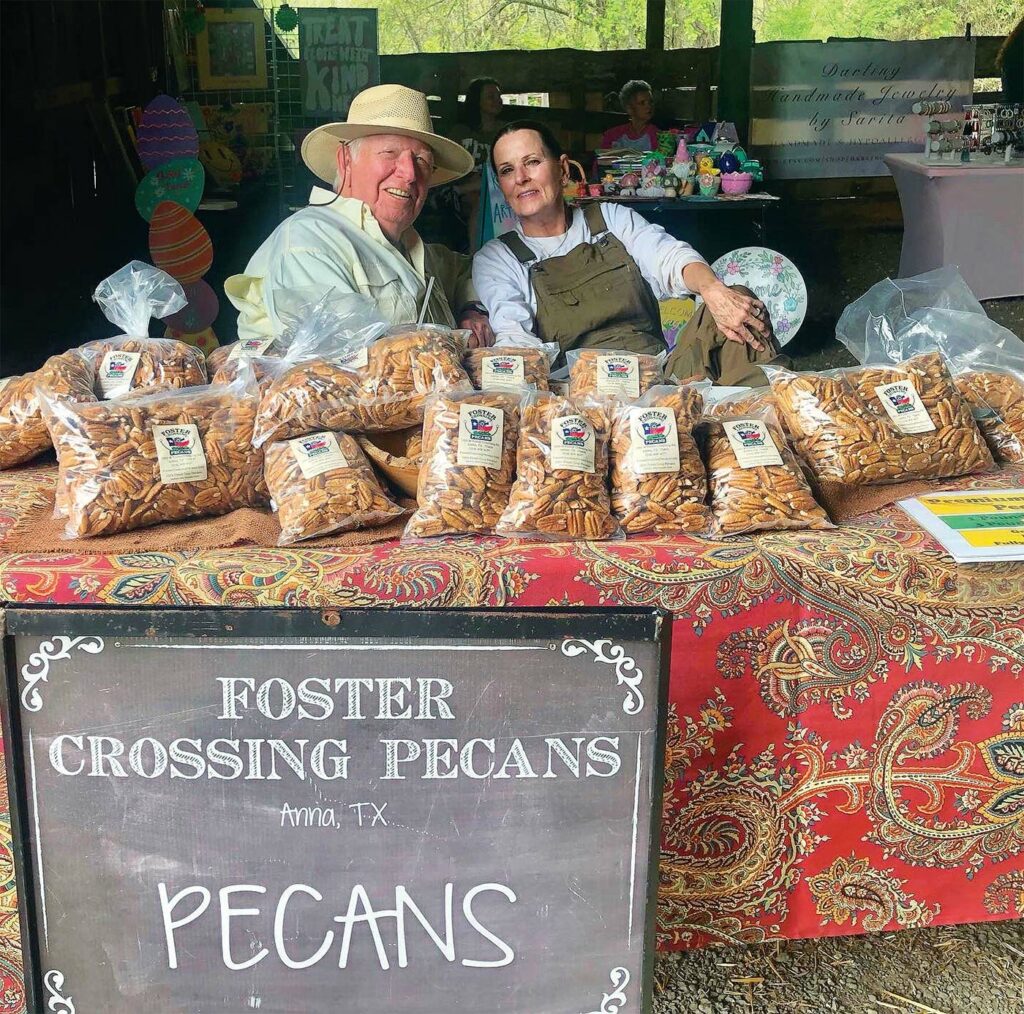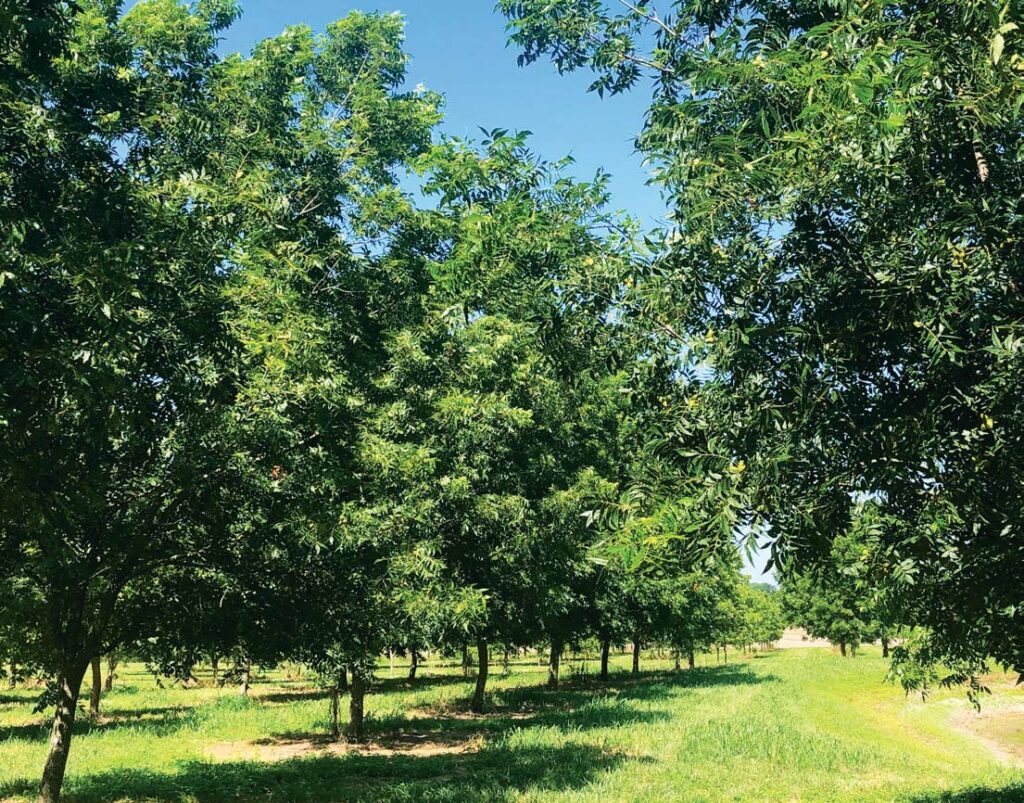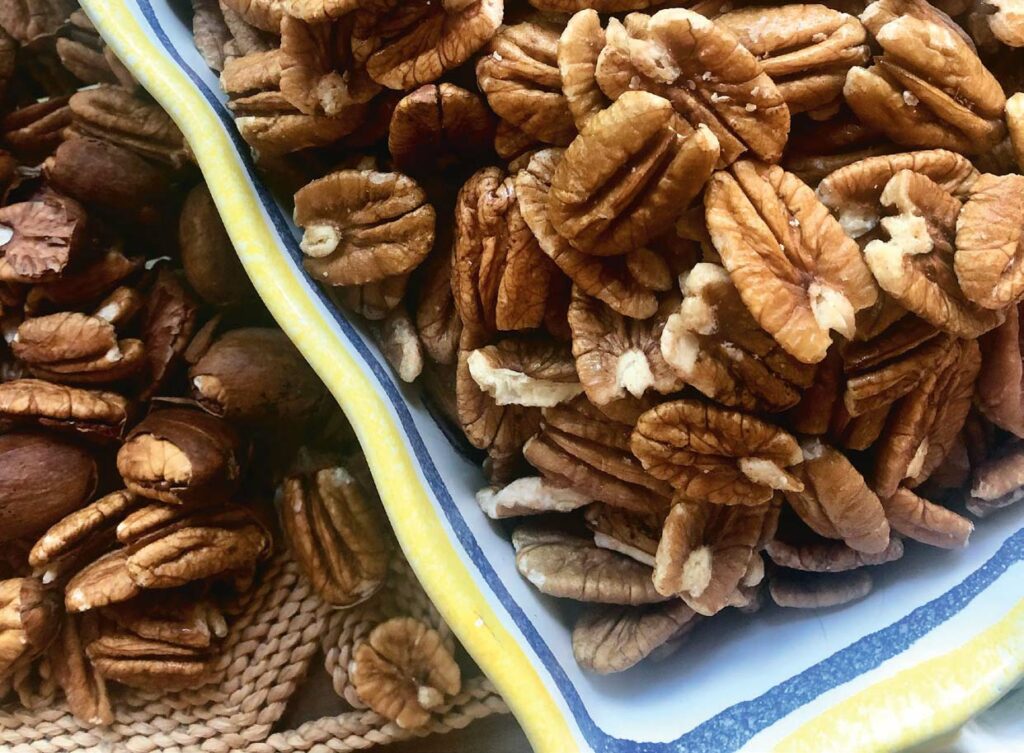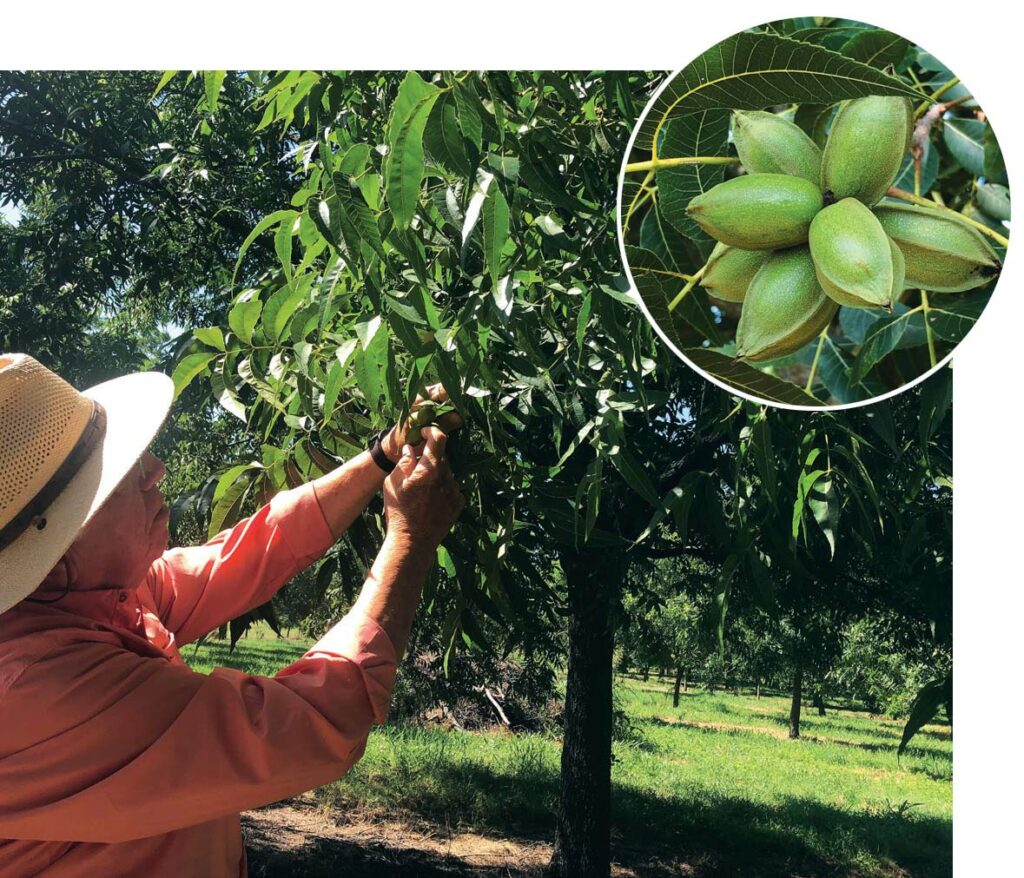
OVER THE ORCHARD AND THROUGH THE WOODS
PHOTOS MARIA WHITWORTH
Just north of where the new Collin County Outer Loop is being built, you will find a hidden gem: a working pecan orchard, farmed and tended by Jim Luscombe and his family. Jim, his wife Robyn, their adult children and at times even the grandkids can be found nurturing this 10-acre orchard of 500 pecan trees through every season, with all hands on deck during the fall harvest.
Great-grandfather Doc Luscombe purchased the first parcel of land around 1912, and at one point the property totaled roughly 1,000 acres. Doc gave the land to his offspring. Jim recalls, “When I was a kid and my grandparents had it, the farm was at its maximum. When I was a senior in high school, Highway 75 came up, which cut off 200 acres. The big utility power lines came through and took another 100 acres. The impact of development keeps coming at us.”
Jim is the fourth generation to inhabit his family’s land, but the first to cultivate a pecan orchard. Previously, cotton and grains grew on the farm.

“I wanted to finish out my life on our family land,” Jim recalls thinking as he prepared to retire from a career in industrial engineering and computer science. His Aunt Martha, who owned much of the land sold him some of her 300 acres. “Twenty years ago, I took all the training from Texas A&M, got all the books, did research to learn where to plant, which varieties to plant, how to plant, and how to care for them. When we started out in 2002, Robyn and I planted 100 trees, bare-rooted, directly in the ground.” Jim dug the holes and Robyn and their girls put the trees in the ground. His idea had blossomed into Foster Crossing Pecans.
Hopping into Jim’s truck, we head over the hills and down to the orchard. The orchard is flanked to the north and south by native pecan trees which are hundreds of years old. Certain that pecan trees would thrive, Jim planted the new orchard between these two native groves, beginning with improved varietals that grow thin, paper shells: Pawnee and Desirable. “Our favorite is Pawnee; it’s the first to produce and the quickest off the tree,” says Robyn. Pecans take about 15 years before growing fruits and have long lifespans. The grand natives may no longer produce fruits, but they stand guard as the great overseers of the young orchard.
“Pecans produce, by nature, every other year. And they use so much energy producing that crop that it takes two years to recover. As a farmer, you can influence that by tending to soil amendments and water. Every year I take soil samples and send them to A&M to analyze, and they send back a report, and from that we have a company in Gunter who custom blends soil amendments. We give our trees nutrients in the spring to help them set fruit.”
During fall harvest season, the extended family jumps in to help, even the littles, and they hire the rest. Harvest starts in October as different varieties ripen. “Jim has them all charted out,” Robyn says. “But one year right before harvest, we had a huge windstorm, and it blew all the pecans together, so we ended up with an ‘Orchard Blend’!”
Harvesting includes shaking, picking, and sorting. It’s a hands-on process, and the imperative is that only the best go into the cracking machine. The Luscombes harvest and cull, and can end up with 5,000 pounds in a good year. “It’s a lot of work!” says Robyn. “And every year there’s something. Last year was the awful freeze and then summer aphids; we had a terrible crop.”
The Luscombes first started selling their pecans in small, limited amounts one blustery, bone-chilling November. They sold them from their farm truck on the side of the road in downtown McKinney, bundled in overalls and heavy coats. Word spread. “Then people started coming to the farm, so we had to figure out a better way. It’s just us producing, and when we’ve sold out, we have to get more ready for the next day,” says Robyn.


The hard work and lack of a middleman are values they cherish. Robyn says, “We’ve passed this work ethic on to the kids, and now the grandkids. It’s also taught them social kindness: people walk in, they’re greeted, we say hello, shake their hand.” Even the grandkids, she says, will explain, “‘Yes, sir, you see these are Pawnee …’ and even the little one is asking, ‘How many would you like?’ We’re passing that standard along.”
Robyn appreciates their regulars. “It’s how we built this business,” she says. “People come up here year after year, and where they used to buy two to three bags, they now stock up on 10, 12, sometimes 25 because they know the quality and appreciate the personal touch.” Freshness can be preserved in the freezer or fridge.
This year, the Luscombes expect a terrific crop. They’ll welcome hundreds of people during the busy pecan season, from November to January. Returning customers know they’ll be getting a little of what Robyn calls “pecan therapy” with a dose of Southern hospitality. “It’s more than pecans,” she says of the land. “It’s a magical place.”. The 2023 crop is ready the first weekend of November. For exact updates and more information, call 214-458-4107.
FosterCrossingPecans.com
1303 W. Foster Crossing Road in Anna, TX
You can also find Jim Luscombe at the State Fair of Texas, judging the Pecan Pie Competition.
Maria Whitworth is Director of Communications for Council for Healthy Food Systems, a non-prot org providing educational workshops for small farmers, giving them the business and marketing skills needed to tap into the growing demand for locally raised, pastured meats, poultry and eggs. HealthyFoodSystems.org
- Maria Whitworthhttps://www.edibledfw.com/author/mariawhitworth/
- Maria Whitworthhttps://www.edibledfw.com/author/mariawhitworth/
- Maria Whitworthhttps://www.edibledfw.com/author/mariawhitworth/
- Maria Whitworthhttps://www.edibledfw.com/author/mariawhitworth/









